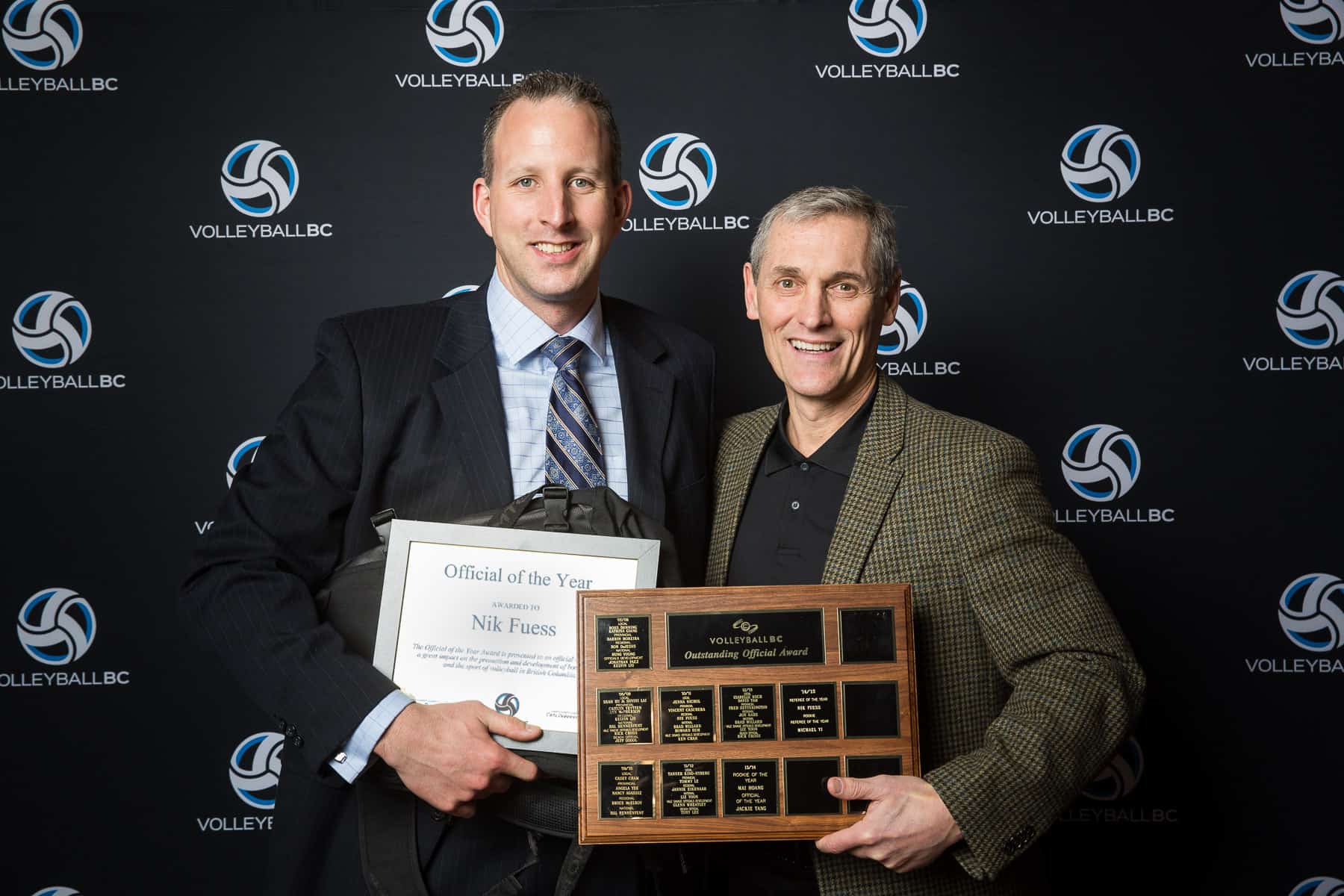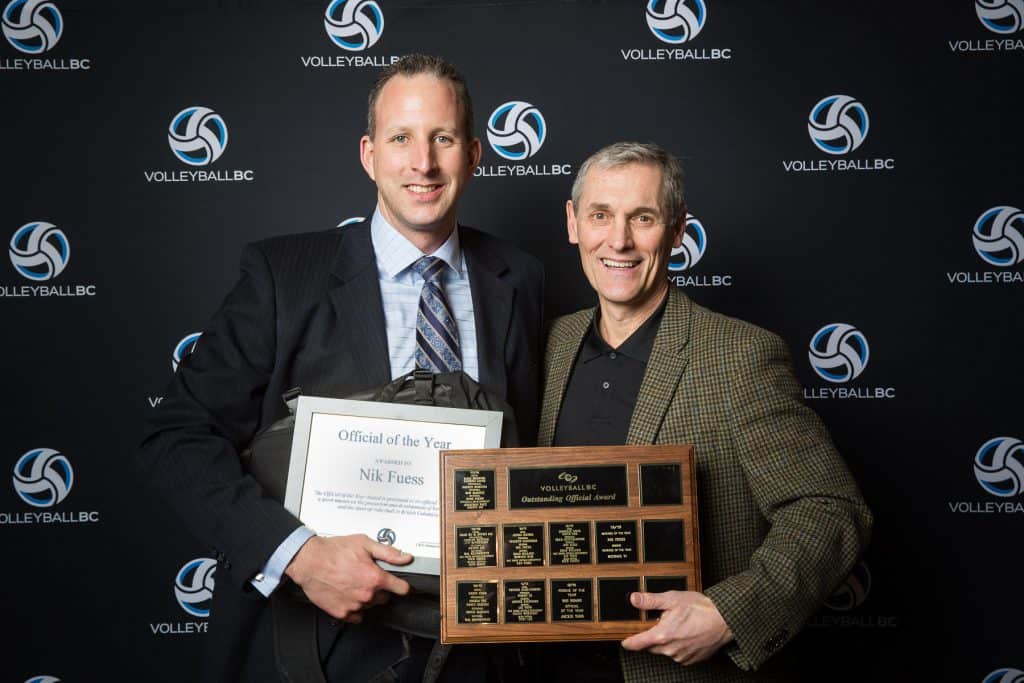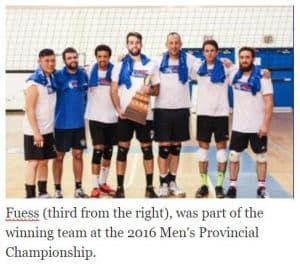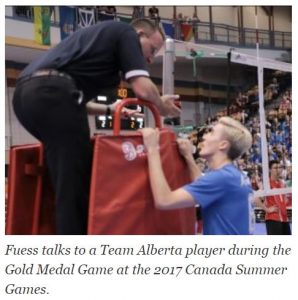

Fuess (left), winning the 2016 Volleyball BC Official of the Year Award at the Annual Hall of Fame Banquet.
For most people, being in the Gold Medal Game of the Canada Summer Games is a once in a lifetime opportunity. But for Volleyball BC Referee, Nik Fuess, being in the game is a goal he’d achieve later than he’d originally planned.
The Canada Summer Games showcases the best 18U volleyball players (most players are 18 years-old) in the country, and with the Games only coming around every four years, players only get one chance at representing their province.
Fuess was a part of the Team BC program for three years growing up, but would be one of the last players cut from Team BC in 2001 when they won Gold at the Canada Summer Games – the only time he’d ever been cut by Team BC.
“It was a massive disappointment, the biggest of my life at the time, but it’s kind of interesting to be in the Gold Medal Game as a referee 16 years later,” said Fuess, as he reflected on his first trip to the Canada Summer Games and officiating the Gold Medal Game between Ontario and Alberta.
Overall, Fuess was happy with how his tournament went and humble in his selection to referee the Gold Medal Game with Manitoba referee, Taras Ilkiw, as the second referee.
“There’s three teams in a game,” said Fuess. “Team “A”, team “B” and team referee, and when you have a second referee that you can completely and 100% rely on without any doubt, it makes your job so much easier because you just need to focus on what you’re doing.”
And as a result, Fuess feels he called a great game in the Gold Medal Game.
BECOMING THE REFEREE HE IS TODAY
 Fuess began officiating to make a little extra cash on the side while he played volleyball in high school and university, but started getting more serious about the job roughly nine years ago.
Fuess began officiating to make a little extra cash on the side while he played volleyball in high school and university, but started getting more serious about the job roughly nine years ago.
“I was never good enough to play on the National Team, and I knew that, but I always wanted to be involved with volleyball at the international level,” said Fuess. “My thought was, my best chance would be as a referee, so I stuck with it, and still to this day that’s what I’m aiming for.”
But being a referee takes a different type of person because of the constant scrutiny you face while on the job.
“The best compliment is when no one notices you at all, which takes a while for you to accept – if no one says a word, then you were fantastic.”
Fuess also credits his playing days as being a major factor in him becoming the referee he is today. And the main reason he’s had the opportunities to officiate at the events he has.
“To be honest, I can’t say enough about how valuable being a player is to being a referee.”
He went on to add, that the biggest problem with developing referees is most people can learn to memorize a rule book, but at the end of the day, you have to have the feel and sense the game that you get as a player.
“You can’t teach that little voice inside your head that says, ‘the rules say “A”, but my instincts tell me that “B” is a better decision,” said Fuess. “Every situation is a little bit different, and if the referee doesn’t understand the spirit of the game or the spirit of the rules and why things happen, then it becomes very difficult to apply the rules as they are meant to be applied.”
FUESS’S ADVICE FOR YOUNG REFEREES

“Always be humble. The minute you become overly confident it’s game over for you.
Secondly, be respectful and open for advice from absolutely everyone and that includes people who are not as knowledgeable as you or people who may not have any business talking to you – just listen.
When someone tells you something that is blatantly wrong you don’t always have to correct them, because as a referee, you get that all the time with people telling you, ‘you should have called this, or that was wrong’ and you know for a fact that they’re wrong, but sometimes, getting pulled into an argument isn’t worth it.
Referees need to behave like politicians and sometimes you have to turn the other cheek and be the better person. There’s nothing wrong with saying, thanks for letting me know that, thank you.
Thirdly, always look to improve.
It’s easy to feel like I got this. I’ve been refereeing games, I’m good, I never have any problems, people seem to like me, and then you take your foot off the gas.
Refereeing is just like being an athlete and you can always improve and I know that even after nine years, I feel I’m just starting to figure refereeing out.
If you’re interested in becoming a Volleyball BC referee, check out our “Becoming a Referee” page
Did we miss something?
Know an Athlete, Official, Coach or Volunteer that deserves recognition?
Got an idea for an article?
Drop us a line with your suggestions at [email protected] and we might just do a feature article on it!
